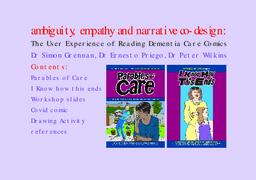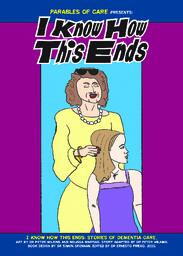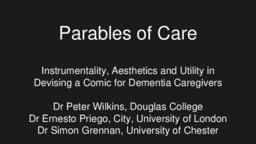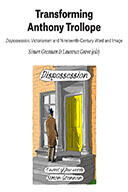Grennan, Simon
Person Preferred Name
Simon Grennan
Related Works
Content type
Video
Description / Synopsis
DC Research Cafe presentations May 27, 2021: "Parables of care: Using comics to enhance the impact of dementia care practice and research" begins at 2 minutes, 5 seconds and "Raising the curtain on the lived experiences with dementia" begins at 16 minutes, 15 seconds.
Origin Information
Content type
Digital Document
Abstract
Conference presentation delivered at the 11th <a href="https://internationalgraphicnovelandcomicsconference.com/igncc-2020/">International Graphic Novels and Comics Conference</a> (July 2020, online format).
<p>The World Health Organisation has anticipated that by 2030, 82 million people will have dementia and 152 million by 2050. In this user-centred online workshop, participants will read, compare and discuss two short comic books resulting from user-centred design and narrative research design methods: Parables of Care: creative responses to dementia care (Grennan, Priego, Sperandio, Wilkins 2017) and I Know How This Ends: Stories of Dementia Care (Priego, Wilkins, Martins, Grennan 2020).
Enabled by screen/document sharing via videoconferencing software, participants will 'user-test' both comics, interrogating concepts of ambiguity, fracture, empathy and the genres of the parable and tragedy, and will be prompted to discuss the challenges and opportunities for co-desinging their own creative responses in comics form.
The workshop seeks to test the hypotheses and motivations behind both comics and will allow participants to discuss and provide direct feedback on the narrative co-design methods employed in the creation of both comic books, in a practical effort to fully place the users/readers in the centre of the research and development cycle.</p>
Origin Information
Content type
Digital Document
Abstract
I Know How This Ends is the second volume in a series that started with Parables of Care: Creative Responses to Dementia Care (2017). The project explores the potential of comics to enhance the impact of dementia care research. This comic book presents, in synthesised form, stories crafted from narrative data collected via interviews with professional caregivers, educators, and staff at Douglas College in Vancouver, Canada, who have cared for relatives and people with dementia in hospital.The intention of the book is to show the importance of feeling in care-giving, the professional aspects of which are sometimes at odds with the family systems aspect of dementia.
Origin Information
Content type
Digital Document
Abstract
Conference presentation delivered at the <a href="https://www.graphicmedicine.org/">Comics & Medicine Conference</a> (June 2017), in Seattle, Washington.
<p>This presentation reports on work in progress by Ernesto Priego at City University of London, Peter Wilkins at Douglas College, and Simon Grennan at The University of Chester to develop two short comic book manuals of best practices for dementia care in the UK and Canada. This project collects information in focus groups from caregivers from across disciplines (e.g. nurses, psychiatric nurses, healthcare support workers, therapeutic recreation practitioners, dental assistants) in consultation with comic book artists to create comics that speaks to a variety of audiences. The project explores the possibility of synthesizing qualitative data--interdisciplinary attitudes and approaches--in comics form. So doing it tackles a logistical problem (gathering the information) and a technical one (representing the information). Furthermore, the project looks at the significance of the aesthetics of conveying information: what are the advantages of depicting best practices in comic book form as opposed to using an infographic or other document. Do caregivers (and family members of dementia sufferers) find the information in comics form more subjectively and objectively accessible than in other conveyances. We are intrigued by the possibility that the artistic representation of medical information develops and enhances empathy and identification that otherwise might be suppressed. The project also explores the different practices and approaches of two different health systems: the NHS in the UK and health authorities in British Columbia, Canada. The differences between the two comics will illuminate discrepancies between the two systems vis a vis dementia care and provide opportunities to analyze those discrepancies. At the time of the conference, we will be in the middle of the project, and we propose to present how it is going, the pitfalls and triumphs. We will be able to report on the focus groups/ artist consultations and show some preliminary work on the comics.</p>
Origin Information
Content type
Digital Document
Abstract
Parables of Care presents true stories of creative responses to dementia care, told by carers, taken from a group of over 100 case studies. Creativity, emotional intelligence and common sense are amply shown in these 14 touching and informative stories. Drawn by Dr Simon Grennan with Christopher Sperandio. Edited and adapted by Dr Simon Grennan, Dr Ernesto Priego and Dr Peter Wilkins. Parables of Care explores the potential of comics to enhance the impact of dementia care research.
http://carenshare.city.ac.uk.
Origin Information
Content type
Digital Document
Description / Synopsis
The chapter, "An incomplete project: Graphic adaptations of Moby-Dick and the ethics of response" was written by Peter Wilkins (Douglas College Faculty). A cross-disciplinary collection of essays in the fields of nineteenth-century history, adaptation, word/image and Victorianism. Featuring new writing by some of the most influential, respected and radical scholars in these fields, Transforming Anthony Trollope constitutes both a close companion to Simon Grennan’s 2015 graphic novel Dispossession – an adaptation of Anthony Trollope’s 1879 novel John Caldigate – and a forward-looking, stand-alone addition to current debates on the cultural uses of history and the theorisation of remediation, illustration and narrative drawing. -- Back cover.
This volume is part of the Studies in European comics and graphic novels series
Origin Information






